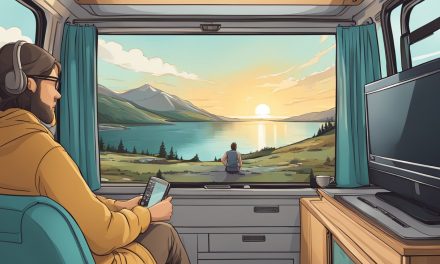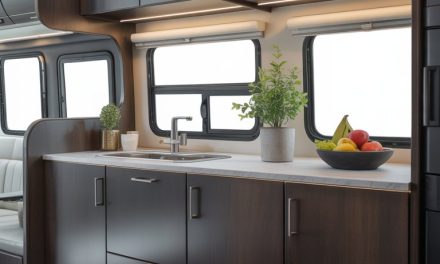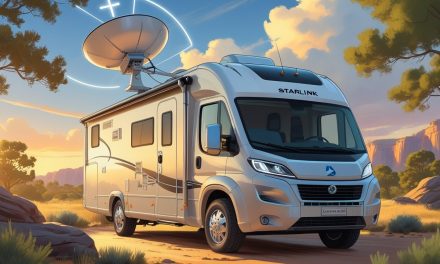Would you like to save this article?
Living in an RV full-time has become an increasingly popular lifestyle choice for many people seeking adventure, freedom, and simplicity. From retirees to digital nomads, individuals and families are embracing the open road as their home. This unconventional way of living offers unique opportunities and challenges that appeal to those looking for a change from traditional housing.
84% of our readers don’t live in their RV’s full time. That makes perfect sense. But have you ever considered the possibility?
Full-time RV living allows people to experience new places, meet diverse communities, and create lasting memories while maintaining the comforts of home. For some, it’s a temporary adventure, while for others, it becomes a permanent lifestyle shift. As more people discover the benefits of mobile living, the reasons to consider full-time RV life continue to grow and evolve.
1) Freedom to Explore
Living in an RV full-time offers unparalleled freedom to explore new places. Travelers can change their surroundings on a whim, chasing perfect weather or following their curiosity.
RV life allows people to visit national parks, scenic coastlines, and charming small towns across the country. They can stay as long as they like in each location, truly immersing themselves in the local culture and natural beauty.
This lifestyle provides the flexibility to follow job opportunities or pursue passions in different regions. RVers can attend festivals, visit family and friends, or discover hidden gems off the beaten path.
The open road becomes home, with endless possibilities for adventure. Full-time RV living turns every day into an opportunity to see something new and create lasting memories.
Without being tied to a specific location, RV dwellers can satisfy their wanderlust and experience the diverse landscapes and communities across the nation. This freedom to roam and explore is a major draw for many who choose the full-time RV lifestyle.
2) Cost-Effective Living
RV living can significantly reduce monthly expenses compared to traditional housing. Without a mortgage or rent payment, RV dwellers often find their overall costs are lower.
Campsite fees and fuel are primary expenses, but these can be managed through careful planning. Many RVers save money by staying at low-cost or free campsites when possible.
Utility bills tend to be lower in an RV. With less space to heat, cool, and light, energy costs typically decrease. Water and sewage expenses are often included in campground fees.
Property taxes and homeowners insurance are eliminated for full-time RVers. Instead, they pay for RV insurance, which is generally less expensive.
Downsizing to an RV naturally reduces spending on material possessions. With limited storage space, RVers tend to focus on essentials and experiences rather than accumulating stuff.
While initial costs for purchasing an RV can be substantial, many find that over time, the savings outweigh the upfront investment. Some RVers even work remotely or take seasonal jobs to supplement their income while traveling.
3) Minimalist Lifestyle
Full-time RV living naturally encourages a minimalist lifestyle. The limited space in an RV requires downsizing and prioritizing possessions, leading to a simpler way of life.
Living with less stuff can be liberating. RV dwellers often find they need fewer material items than they initially thought. This lifestyle shift helps people focus on experiences rather than accumulating things.
Decluttering becomes a necessity when moving into an RV. Many embracing this lifestyle sell or donate items they no longer need. They keep only what’s essential or truly meaningful.
RV living promotes creative use of space. Multi-functional furniture and clever storage solutions become the norm. Every item serves a purpose, reducing unnecessary clutter.
This minimalist approach often extends beyond physical possessions. Full-time RVers may find themselves simplifying other aspects of their lives, such as finances and daily routines.
The result is often a more streamlined, stress-free existence. With fewer material concerns, RV dwellers can concentrate on what truly matters to them.
4) Closer to Nature
Living in an RV full-time allows people to immerse themselves in the natural world. Instead of being confined to urban environments, RV dwellers can park their homes in scenic locations surrounded by forests, mountains, or beaches.
This proximity to nature provides ample opportunities for outdoor activities. Hiking, fishing, birdwatching, and stargazing become everyday experiences rather than occasional weekend outings.
The changing scenery keeps life interesting. RV inhabitants can follow favorable weather patterns, chasing warm sunshine in winter and cool breezes in summer. They can wake up to different views and wildlife sightings each day.
Being closer to nature often leads to a greater appreciation for the environment. Many full-time RVers become more conscious of their ecological footprint and adopt sustainable practices. They learn to conserve water, use solar power, and minimize waste.
The natural surroundings also tend to have a calming effect. The sounds of rustling leaves, flowing water, or chirping birds replace urban noise. This peaceful atmosphere can reduce stress and improve overall well-being for those living the RV lifestyle.
5) Avoiding Winter
Many full-time RVers choose to escape harsh winter conditions by heading to warmer climates. This lifestyle allows them to follow the sun and enjoy mild temperatures year-round.
RV enthusiasts often plan their routes to stay ahead of cold fronts and snow. They might spend winters in popular southern destinations like Florida, Arizona, or Southern California.
This nomadic approach lets travelers avoid the challenges of winterizing their RV and dealing with freezing temperatures. It also provides opportunities to explore new areas and outdoor activities during traditionally cold months.
Some RVers become “snowbirds,” splitting their time between northern and southern locations based on the seasons. This strategy helps them maintain connections in multiple places while dodging extreme weather.
By avoiding winter, full-time RVers can reduce heating costs and minimize wear on their vehicles from harsh conditions. They also sidestep potential issues like frozen pipes or difficult driving on icy roads.
6) Work Life Balance
Full-time RV living can significantly improve work-life balance. Many RVers find they can better blend their professional and personal lives when on the road.
Remote work opportunities have expanded, allowing people to earn a living from anywhere with an internet connection. This flexibility enables RV dwellers to choose picturesque locations as their temporary offices.
The ability to change scenery frequently can boost creativity and productivity. RVers often report feeling more inspired and motivated when working against the backdrop of nature or new environments.
Time saved on commuting can be redirected towards hobbies, relaxation, or exploring new destinations. This extra time contributes to a more fulfilling lifestyle and reduced stress levels.
RV living also allows for easier scheduling of work around preferred activities. People can take advantage of good weather for outdoor pursuits and work during less ideal conditions.
The minimalist lifestyle associated with RV living often leads to reduced work hours. With lower expenses, many find they don’t need to work as much to maintain their desired standard of living.





